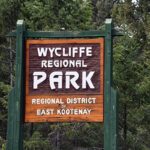Home »

Water Hub new home for Columbia Basin water data
The Columbia Basin Water Hub is a new open-source online platform for storing water-related data collected throughout the Columbia Basin region so communities and decision makers can have easy access to the important information they need for watershed management in an era of climate change.
Climate change impacts on Columbia Basin water resources have been documented in numerous reports dating back to 2006. Last June, the University of British Columbia published a 30-year study suggesting the glacier-melt contributions in the Canadian Columbia Basin have already passed peak water, exacerbating a regional climate-driven trend to decreased summer streamflows.
“The Columbia Basin Water Hub allows for groups within the Columbia Basin to house water data in a central location to support the development of a Basin-wide, water balance approach needed for subsequent water budgeting as hydrological flows continue to be impacted,” said Living Lakes Canada Executive Director Kat Hartwig. “We need to make sure that we’re working collaboratively to address fresh water protection and the Water Hub is a key organizing component of this.”
A water stewardship non-profit organization that is based and operates primarily in the Columbia Basin region, Living Lakes Canada (LLC) initiated the Water Hub project in response to a 2017 Columbia Basin Trust report that pointed to the need for a coordinated monitoring effort and central data repository to fill important water data gaps in the Columbia Basin region.
“We look forward to learning more from our users, reaching as many people as possible, and providing a spring of water data that anyone can use to have an impact in protecting their community’s water resources, and the Basin’s,” said Santiago Botero, LLC Database Manager. “We also want to thank everyone who has collaborated with us and provided us with feedback and guidance. We look forward to having many people use the Water Hub.”
LLC organized a conference in late 2017 that was attended by water data experts from across North America and began the collaborative approach to determining the best solution for water data collection, analysis, sharing and storage, a process that involved volunteer and paid steering committee members, various agencies, industry, academia and community organizations with the participation and collaboration of First Nations.
This past winter, iterative testing of the database with different user groups from around the Basin was finalized, and data governance was defined to ensure provincial and national metadata standards will be met.
Water-related data can be submitted by community-based monitoring groups or by municipal, regional or First Nations governments, and industry. Data can be linked to any existing databases that are available openly online. The Water Hub will also be one of the hosts of the main database for Foreshore Integrated Management Planning data collected in partnership with the Department of Fisheries and Oceans.
“This approach to coordinated monitoring is integral for developing a collective understanding of water data in the region,” said Brianna Burley, Columbia Basin Trust Manager, Environment. “We are excited to support projects like this one that undertake long-term monitoring and help to maintain and improve ecological health and native biodiversity in the Basin.”
“We have to use technology in a way that helps us connect to nature and collect the information we need to make better decisions,” said Carol Luttmer, LLC Groundwater Program Manager.
If your organization is interested in sharing data or resources with the Water Hub, please contact Database Manager Santiago Botero at [email protected].
Lead image: The Columbia Basin Water Hub is making water data readily available in order to facilitate informed decision making around the Columbia Basin’s fresh water supply. Screenshot.
Submitted







